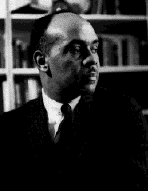 |
With things going so well I distributed my letters in the mornings, and saw the city during the afternoons. Walking about the streets, sitting on subways beside whites, eating with them in the same cafeterias (although I avoided their tables) gave me the eerie, out-of-focus sensation of a dream. My clothes felt ill-fitting; and for all my letters to men of power, I was unsure of how I should act. For the first time, as I swung along the streets, I thought consciously of how I had conducted myself at home. I hadn't worried too much about whites as people. Some were friendly and some were not, and you tried not to offend either. But here they all seemed impersonal; and yet when most impersonal they startled me by being polite, by begging my pardon after brushing against me in a crowd. Still I felt that even when they were polite they hardly saw me, that they would have begged the pardon of Jack the Bear, never glancing his way if the bear happened to be walking along minding his business. It was confusing. I did not know if it was desirable or undesirable... --from Invisible Man
The American writer Ralph Waldo Ellison, b. Oklahoma City, Okla., Mar. 1, 1914, achieved international fame with his first novel, Invisible Man (1952). He was influenced early by the myth of the frontier, viewing the United States as a land of "infinite possibilities." The close-knit black community in which he grew up supplied him with images of courage and endurance and an interest in music.
From 1933 to 1936, Ellison attended Tuskegee Institute, intent upon pursuing a career in music; his readings in modern literature, however, interested him in writing. In 1936 he moved to New York City, met the novelist Richard Wright, and became associated with the Federal Writers' Project, publishing short stories and articles in such magazines as New Challenge and New Masses. These early details of his life, set down in Shadow and Act (1964), a collection of political, social, and critical essays, enhance an understanding of Invisible Man. The influences of the frontier tradition, the black community, and Ellison's interest in music combined to create the richly symbolic, metaphorical language of the novel, as displayed in the Rhinehart and Mary Rambo episodes. Its theme, the human search for identity, also reflects Ellison's early interest in Ralph Waldo Emerson, Mark Twain, and Henry David Thoreau and his later debt to Fyodor Dostoyevsky, Andre Malraux, and Wright. Invisible Man won the National Book Award in 1953. Since 1970, Ellison has been Albert Schweitzer Professor of the Humanities at New York University and has lectured extensively on black folk culture....
Addison Gayle
Bibliography: Benston, K.W., ed., Speaking for You: Ralph Ellison's Cultural Vision (1986); Hersey, John, ed., Ralph Ellison: A Collection of Critical Essays (1974); O'Meally, R.G., The Craft of Ralph Ellison (1980). Text Copyright © 1993 Grolier Incorporated [This text is from 1993; Ellison died in 1994.] [Just published: The Collected Essays of Ralph Ellison (Modern Library, 1995).]
Ellison Links
Press-Gopher Links
|



